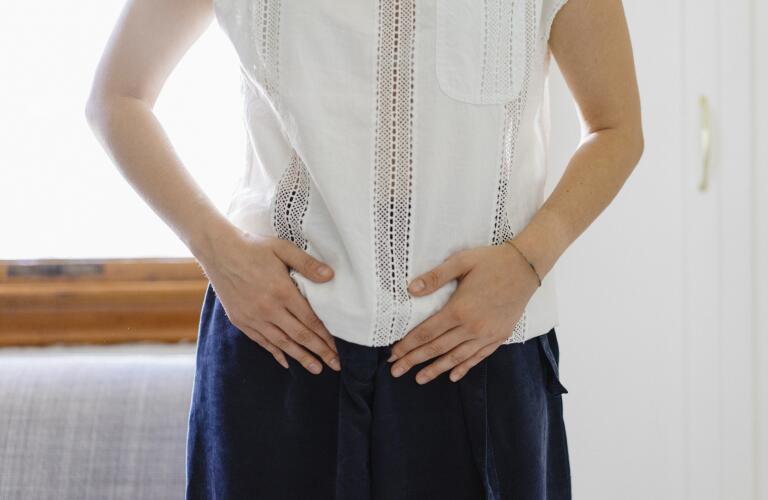
Uterine fibroids can cause heavy bleeding during a woman’s menstrual cycle, which can interfere with her ability to go about her day and significantly impact her quality of life. Dr. Richard Guido, an Ob/Gyn who frequently treats women with fibroids, shares what patients should know.
A: Uterine fibroids are benign, usually noncancerous growths in the wall of the uterus. The uterus is a big muscle, with special types of muscle cells, and fibroids are made up of these muscle cells. They can be highly variable in terms of their size and location, and both these factors influence the symptoms they can cause. If they get large enough, fibroids will start to press on surrounding organs like the bladder and bowel, which can cause a variety of symptoms. About 50% of Caucasian women and 70% of African-American women between the age of 35 and 50 have fibroids. Twenty-five percent of women with fibroids will have symptoms that may include heavy menstrual bleeding, pelvic pain or pressure, and/or frequent urination.
A: Often, fibroids go undiagnosed and untreated because women don’t realize their bleeding is excessive. If you ask 10 women if their periods are heavy or light, their responses would vary even if they were all bleeding the same amount. It’s often a subjective assessment and women don’t know if there’s something wrong. In most cases, fibroids grow over time, so you may notice a change in the amount of blood each month as your fibroids get bigger. The realistic way of determining whether your cycle is heavy or not is to reflect on how it impacts your life. My patients with heavy bleeding talk about how they can’t leave the house when they’re on their period; they might have to change their pad every 30 minutes or cover their sheets in towels at night because they bleed so much. It really impacts their day-to-day life, especially considering they’re experiencing these problems for roughly a week out of every month.
Another way to tell if bleeding is heavier than normal is to focus on your pain levels. The more bleeding a woman has, the more pain she experiences, because there are chemicals released from the uterus that are proportional to the amount of blood lost. These chemicals cause the muscle of the uterus to contract, which leads to the cramping and pain many women experience with their cycle. If you’re unsure if your bleeding and pain levels are normal or high, the best thing to do is talk to your doctor and share how your menstrual cycle affects your lifestyle.
A: Bleeding excessively each month can really impact your life and your ability to do the things you need to do. But beyond that, heavy blood loss can lead to anemia, in which you don’t have enough healthy red blood cells to bring oxygen to your body’s tissues. Women with anemia can end up very ill with weakness and fatigue, and they may ultimately require a blood transfusion. That’s a worst case scenario that can severely impact someone’s health and quality of life, so we try to prevent the situation from reaching that point. Fortunately, we have a variety of treatment options that can keep fibroids managed to alleviate symptoms like heavy bleeding, so women can get back to their normal lives.
A: Treatments for fibroids are individualized for each patient, based on their symptoms and the characteristics of their fibroids. There are many different treatments available, from medication to surgery to interventional radiological procedures. As an Ob/Gyn, I always try to employ the least invasive method that will work. Taking ibuprofen is helpful for many patients, because it reduces bleeding and pain. We also employ the use of oral contraceptive pills. During their period, patients can also take a medication that affects how the body clots blood, called tranexamic acid. There are some long-term medications on the market that can bring about a reversible menopausal state, which can be used to treat fibroid symptoms. Women should talk to their doctor about these options.
Turning to more invasive methods, patients are often amenable to trying an intrauterine device (IUD), which is inserted into the uterus and can reduce bleeding by half for many women. We can also employ minimally invasive procedures like uterine artery embolization, which causes fibroids to shrink and die. For some women, surgery to remove fibroids may be the right approach, and ultimately we can perform hysterectomies in patients who aren’t concerned with maintaining their fertility.
A few treatments are new to the field, including high intensity focused ultrasound (HIFU) which uses ultrasound to shrink fibroids and improve bleeding, and radiofrequency ablation, which involves using electrical energy to shrink the fibroid.
There’s no one-size-fits-all treatment for heavy bleeding due to fibroids, but with our wide variety of options, patients should feel confident that they will find relief and be able to go about their daily routines with improved quality of life.







